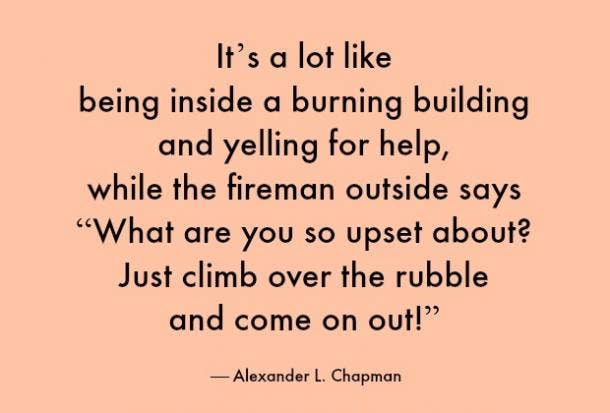
Since childhood, I have suffered from various mental health problems. I still managed to get a wholesome education, ceasing at a BA Honours Degree. I have a very colourful CV and have never committed a crime or inflicted violence upon anyone or thing, despite the bad reputation that goes hand in hand with people who have severe ill mental health, which I do.
The umbrella medical term for my main diagnosis is BPD (Borderline Personality Disorder) or EUPD (Emotionally Unstable Personality Disorder). Depending on where you are in the world, the labels may differentiate in title but they are absolutely identical in prognosis. The abbreviation, BPD, is slowly filtering more into society. I believe this is because more people are being medically diagnosed with the psychiatric illness, as there is more understanding in the professional world (although I have personally encountered a lot of negative confrontation within mental institutions, which are supposedly non-judgemental sanctuaries of safety, support and recovery).
Yet the words are falling onto deaf ears, when it comes to the majority of Joe Public, because there is not enough accurate information out there to explain exactly what BPD is and therefore why the diagnosed have such complex relationships with loved ones and themselves. Misinformation births misunderstanding. If there is no information or guidance on how to react to someone close to you, a colleague, friend, lover, partner, parent, child or acquaintance, whose mood constantly fluctuates in so many interchanging and irregular ways that are unbeknownst to you, how are you supposed to know what to do? What is the appropriate way to react? What help do they need? What help is available? How do you access care, advice, support and relief for yourself?
People with BPD often seem to be extrovert with their troubles, which may reflect as ‘attention seeking’ behaviour; I self-harm, I have attempted suicide, I suffer intense feelings and emotions, I am manic or depressed, I cannot compute emotional frustration and I feel like no one loves, likes, understands or cares for me. I’ve been labelled as ‘over dramatic, too sensitive and a nightmare’ and it is a common mistake that I act out when I don’t get my own way, but it is far more complicated than that. I am describing symptoms of BPD, not premeditated behaviour or choice.
My irregular mind-set and behaviour may appear to be ‘exhibitionist’, it is a common misconception that we want to push people away and hurt the ones that we love, when in fact we are hurting, we feel alone and pushed away. We may seem ‘selfish, desperate, controlling, manipulative and purposefully holding people ransom’, but it is the opposite - we struggle to maintain any control and stability when extremely unwell. All we really want is love and acceptance, but all things considered, this may be hard for you to give.
I appreciate how frustrating and confusing it must be to keep up with someone with BPD, as we contend with psychological splitting every single day. If you remain close, it will of course have an impact on you and it can be unbearable for everyone. You are entitled to feel hurt, although it may not be the best idea to express this to the unwell but in order for your processing, communication is key. You must release the stress that you feel has been bestowed upon you, in order to maintain your own mental wellbeing. Our actions can be testing and no doubt confusing. You may wonder what happened to the person that you once loved. That person is sick. BPD is not contagious but the symptoms and our inability to regulate emotions can be crippling.
There is no shame in asking for help and establishing boundaries. We fear your rejection and abandonment but taking some time for yourself is crucial, even though we may not fathom your reasoning at the time. Please acknowledge that BPD is a complex disability. If we unintentionally cause you harm or pain, bitter sweet, we most likely love you!
By No One
adiaryfromnoone (all social media)
aka Jade Laurie-Hart
aka Jade Phipps
